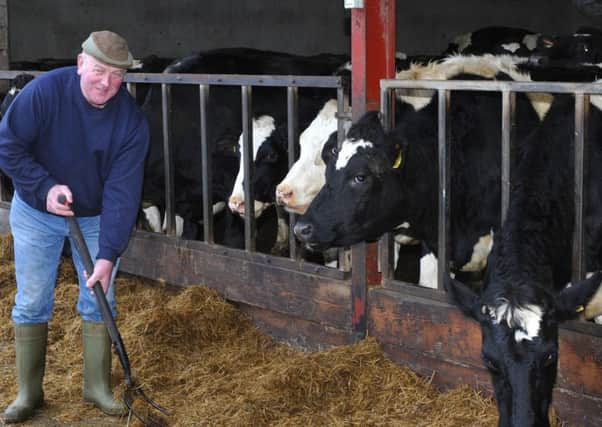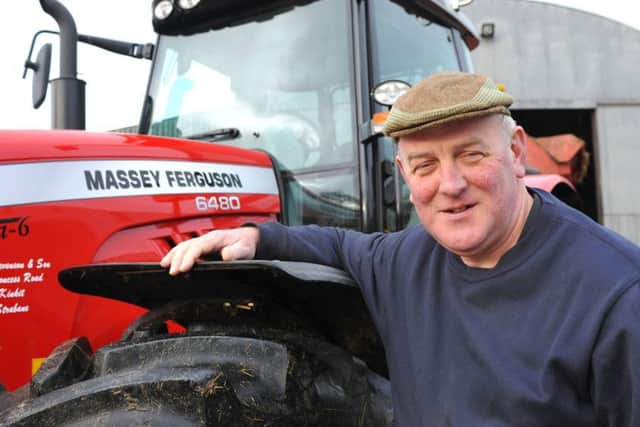Lodge Life: Farming a way of life for Grand Master Edward Stevenson


The early morning alarm clock usually fills most of us with trepidation – but not if you are the grand master of the Orange Institution and a dairy farmer.
Edward Stevenson has many important tasks in his role, perhaps none more so than tending to his herd of 100 cows.
Advertisement
Hide AdAdvertisement
Hide Ad“The alarm goes at 4.45am and after a quick bite of Weetabix it is for the milking parlour,” the senior Tyrone Orangeman said.


“Sometimes the late nights and early mornings don’t always come easy together!”
Mr Stevenson, who has been farming for over four decades at the family home outside Ardstraw, overlooking neighbouring Co Donegal, balances his daily agricultural routine with his voluntary leadership role – regularly attending meetings and functions across Northern Ireland and the border counties.
However, the grand master wouldn’t have it any other way.
“Farming is in your blood – otherwise you wouldn’t be doing it,” he maintains.
Advertisement
Hide AdAdvertisement
Hide Ad“When you start certain projects and finish them – you get a real sense of satisfaction in completing them. It’s hard work but very rewarding.
“It is lovely in the summer time, particularly in the mornings, when you go out to your work you feel as though you are almost in touch with nature. I always like that part of it.
“If you looked at [farming] from a financial basis, you might say you were crazy – but job satisfaction is a big thing. You are very much your own boss.
“I joke with Arlene (his wife) ‘I’ll go and get myself another job’, but she maintains I couldn’t work for anyone else!”
Advertisement
Hide AdAdvertisement
Hide AdOutlining a typical day on the farm, Mr Stevenson states the first milking session of the day is usually complete as promptly as 8am.
“After breakfast, I usually deal with phone calls and try to do a bit of office work, when time allows. The rest of the day is typically filled with a variety of tasks. In the winter time, it is nearly always doing something with the cattle. In the summer time, you could be fencing, making silage or a number of other chores.
“Evening milking starts typically around 4pm, and I usually finish before 7pm. Afterwards I am either away or I sit in the house. I very rarely watch TV. My wife always jokes ‘the night you sit in the house, you sit sleeping’.”
The grand master maintains in over 40 years of farming, the past 12 months have been the worst ever in terms of weather.
Advertisement
Hide AdAdvertisement
Hide Ad“Our cows have been inside since August last year – hopefully they will be out by Balmoral Show. Normally, we budget for seven months in winter but that is longer than the norm. The ground is so wet and tramped it’s going to take nearly a year to recover.”
As a result, he says the outside elements are always a challenge – so too the current uncertainty regarding Brexit.
“There are just so many unknowns. We are hoping to put up new sheds and a milking parlour but depending how the end deal pans out could ultimately shape our plans.
“I think eventually it will be a help, as long as the UK secures good trade deals with other countries. Milk is very much a world market. Our good fortune is usually somebody else’s misfortune. There’s usually a drought in Australia or New Zealand which would give us a leg up, and vice versa when we are struggling.”
Advertisement
Hide AdAdvertisement
Hide AdCommenting on the ambiguous nature of the industry, Mr Stevenson added: “Milk went through a real bad period recently when we as farmers were barely covering our costs due to the world market being suppressed. We produce to a very high standard, and it is the case feeds can be used in America and other parts of the world which cannot be used here.
“If the weather is half reasonable we do have an advantage as we are one of the best countries in growing grass. But an excess of rain is not good.”
As for the ongoing local political logjam and a lack of a government at Stormont, the Orangeman is concerned at the ensuing vacuum.
“We need strong representation in the Brexit talks, and nobody is there to represent us at a local level. The farmers’ union can do so much, but there is a need for political impetus.”
Advertisement
Hide AdAdvertisement
Hide AdEdward is assisted by one of his three sons on the farm – David – who is also a partner in the business. He admits David is “left to carry the can a lot of the time” due to Orange business but is glad and appreciative of the family input and support.
Indeed, the Queen’s University graduate inherited the farm from his uncle.
“I actually had accepted a job at the Department of Agriculture, but when my uncle offered me the farm – I grabbed the opportunity. I started from scratch and built the farm up. Whereas my former colleagues worked the routine 9-5, I don’t believe there is the same job satisfaction.”
Asked if he had any plans to do less farming, Mr Stevenson retorted: “Old farmers never retire!”
Advertisement
Hide AdAdvertisement
Hide AdWhilst retirement is not on the immediate agenda, the annual visit to the Balmoral Show certainly is.
“I always enjoy a day out at the show,” he said.
“It is a social event as much as anything else. You meet a lot of friends and former colleagues. I usually struggle to get around the show as you meet so many people you know.”
Commenting on the return of Grand Lodge to the agricultural showpiece this year, he added: “I think members will be glad to see the stand there and it a focal point for them. It also allows us to advertise our museums and many products and showcase the organisation to the wider public.”